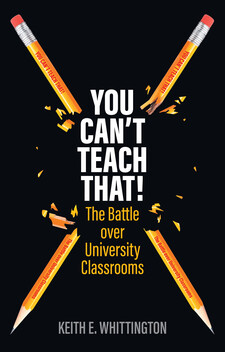“The New Culture War” on American Campuses

Keith E. Whittington, the David Boies Professor of Law and Director of Yale Law School’s new Center for Academic Freedom and Free Speech, outlines a cultural shift in attitude towards academia in his recent book, You Can't Teach That!: The Battle over University Classrooms (Polity Press, 2024).
In the book’s introduction, Whittington describes the contentious attitude scholarly institutions are experiencing in today’s political landscape, noting that attacks on academic freedom aren’t new but what is distinct in this instance is the government’s response to the attackers.
“Conservatives have complained for decades about tenured radicals and political correctness on college campuses, but the willingness of politicians to do something about those complaints is a new and extraordinary development,” he writes. “We are at the beginning of a debate that could reshape the landscape of higher education in America.”

You Can't Teach That! starts with an outline of current threats facing higher education, specifically noting the Stop WOKE Act that aims to ban the use of critical race theory in schools and businesses in Florida, and contextualizes these issues with the victories seen throughout the 20th century for academic freedom on college campuses, such as the 1940 Statement of Principles on Academic Freedom and Tenure that ensured that teachers have freedom in their scholarship, classrooms, and personal viewpoints.
“Universities are on the frontlines of the new culture war, and we should understand the significance of what that means,” he writes.
Whittington emphasizes the importance of students being able to think and articulate their thoughts freely without fear of punishment, writing that it’s essential in fostering innovative ideas and new ways of thinking. He also stresses his concern with government censorship and its potential consequences.
Whittington shows how the Court’s existing First Amendment doctrine imposes meaningful constraints on how government officials can interfere in the teaching and scholarship of professors at public universities. Policies that attempt to suppress the expression of disfavored or controversial political and social ideas in university classrooms run afoul of the Court’s warning that the government cannot attempt to “cast a pall of orthodoxy over the classroom,” according to Whittington. The doctrinal framework and considerations for protecting the intellectual integrity of public universities are not well developed in the Court's current jurisprudence, however, and You Can't Teach That! provides a roadmap for navigating these challenges.
“We are at the beginning of a potentially far-reaching reconsideration of the role of universities in American life and of the authority of politicians to take action against controversial ideas being taught and discussed on college campuses,” he writes. “These efforts will test the willingness of courts to defend professors and universities from political interventions and challenge our understanding of how the First Amendment applies to university classrooms. Potentially at stake is whether American universities will continue to be some of the preeminent institutions of scholarly research and of higher education in the world.”
Whittington holds a B.A. and B.B.A. from The University of Texas at Austin and a M.A. and Ph.D. from Yale University. In addition to his published work in The Washington Post, The Wall Street Journal, The New York Times, The Atlantic, Reason, and Lawfare, he writes for The Volokh Conspiracy blog and hosts The Academic Freedom Podcast. His other works include Repugnant Laws: Judicial Review of Acts of Congress from the Founding to the Present (2019), Speak Freely: Why Universities Must Defend Free Speech (2018), Constitutional Interpretation (1999), and Political Foundations of Judicial Supremacy (2007).


